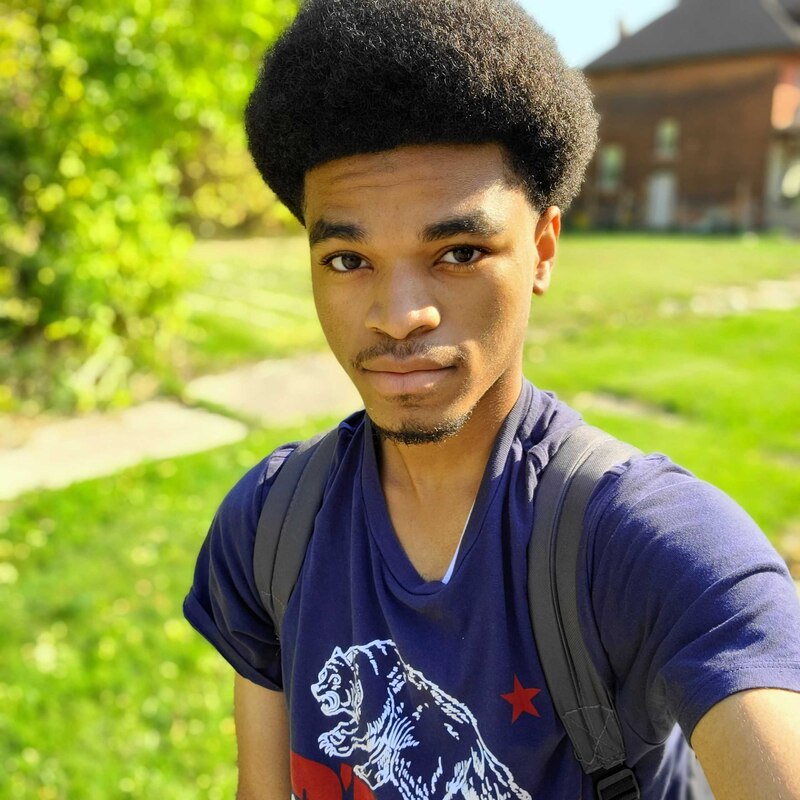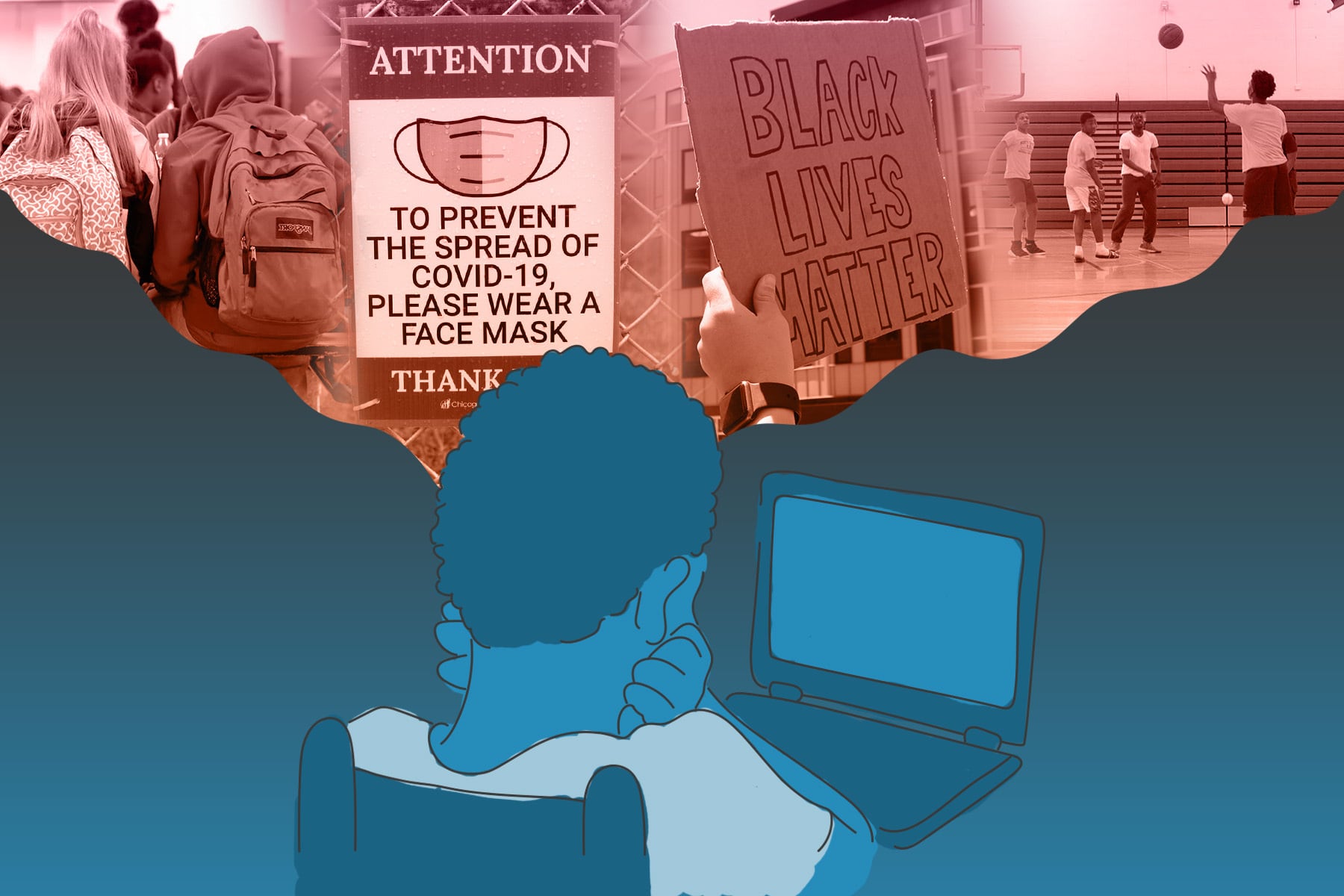Elizabeth Okunawo finds herself descending into a spiral of self-doubt and negativity while learning at home.
Classmates and teachers at school were once healthy distractions for the Cass Technical High School senior. Now that she’s learning remotely, Okunawo said she’s having a harder time escaping her thoughts.
“It’s a battle with yourself,” said Okunawo, 17, who has been struggling with anxiety and depression for several years. “When you daydream, there’s nothing happy about it.”
School counselors and educators said they’re seeing more students like Okunawo who are struggling with mental health issues related to online learning and the pandemic. Students are experiencing more stress, anxiety, and depression — challenges that can lead to poor grades, higher chronic absenteeism, and dropping out of school.
The impact of these difficult times is felt by teenagers across the country. In a national survey of 3,300 young people ages 13-19, about 30% felt unhappy or depressed, and about 25% felt disconnected from schools, adults, and classmates.
Nationwide, districts worked to help students process trauma and grief once they returned to classrooms. In New York, schools offered mental health training for teachers and curriculums focused on coping skills. In Fairfax County, Virginia, schools provided online therapy to all middle and high school students and their parents even if they weren’t previously considered at risk for mental health problems.
To combat the growing problem in Michigan, schools are ramping up efforts to support student mental health.
“This is an unprecedented time, where no one has ever seen anything like this,” said Mark Winston, a social worker in Southfield Public Schools.
‘There’s so much pressure on me and my classmates’

Jeremiah Campbell, a senior at East English Village Preparatory Academy, couldn’t afford to fail this school year. So after experiencing a rocky start, he sought advice from his principal.
The charger for his district tablet broke, and it was frustrating to get it replaced. He missed several assignments. It was hard for him to muster the motivation needed to sit for long hours in front of the screen. In some classes, other students rarely spoke, dampening his once-held enthusiasm for learning.
“Some days I don’t even want to go to school,” he said. “There’s so much pressure on me and my classmates.”
Because the Detroit school district moved to full-scale remote learning until at least January due to a growing number of COVID-19 cases across the city, officials worry students like Campbell will grow frustrated and drop out.
“What is even more concerning is the instances we are unaware of because students are not engaging,” said district spokesperson Chrystal Wilson. The Detroit school district also fears chronic absenteeism will increase this year. Students are considered chronically absent if they miss 18 or more days of school.
In Southwest Detroit, Elizabeth Jaramillo also feels frustrated while learning at home instead of at school.

Procrastinating on schoolwork became a habit for Jaramillo, a senior at Western International High School. She found herself glued to her phone instead.
She paid close attention to the outcome of a polarizing presidential election. She felt agitated over the fate of the country’s undocumented immigrants, some of whom live in her neighborhood.
“It made school feel irrelevant at one point,” she said. “People could take action on the stuff going on outside of school. We’re sitting in front of a screen and hearing teachers talk. And we don’t have a say in anything.” It’s been difficult to deal with these challenges because Jaramillo has less opportunity to engage with peers and teachers while confined at home due to COVID-19.
School counselors, who cannot easily interact with students through a computer screen, may look for signs that students feel powerless to help solve the nation’s problems. In Grand Rapids Public Schools, the district is offering virtual therapy sessions to help students handle stress and take care of themselves. The district serves nearly 15,000 students, who will continue learning remotely through 2020.
District social worker Jamal Fisher said he and other school staff now closely monitor students virtually because they can’t interact with them immediately as they might in a brick and mortar setting.
‘I don’t reach out’
Jaramillo said she’s coping because she relies on her peers for support — they all rely on each other.
But for some, it’s hard to be vulnerable with their peers and adults about their problems.
“I don’t reach out. I don’t want to talk about something that makes me cry,” Okunawo said. She doesn’t feel comfortable sharing her emotions and being perceived as a burden to others, including school staff.

Campbell knows many people who feel they can handle their own struggles without help.
“They feel like they don’t have anybody to talk to,” he said.
Mental health experts said students will not confide in adults if they don’t trust them. As they mature, some students become more distant because they often want independence and privacy.
And Jaramillo is afraid her classmates may risk their health to curb their loneliness.
“I think they’re struggling to stay home and social distance,” she said. “Some might be really risky and see their friends because they’re lonely. That might cause them to get sick” from the virus.
Okunawo said some students also fear their struggles will be dismissed or peers will alienate them because of the stigma often associated with mental health.
The reasons some students don’t ask for help rang true for Elizabeth Koschmann, the director of the University of Michigan’s TRAILS program, which provides mental health training and resources to educators. The program worked with the Detroit Public Schools Community District to launch a community mental health initiative this year.
“There’s sort of a lack of trust that asking for help is going to be productive,” she said, adding that students are mostly taught ways to combat physical illnesses, but often not how to manage stress and anxiety.
Beyond online learning and the election, mental health experts warn that students also are coping with concerns about police brutality against Black people and parents struggling in a depressed economy.
“If you don’t have faith in your school, or in your home, or in society, or you’re out on the street and don’t feel safe, those issues supersede any need to talk about problems because you don’t think of problems, you think of surviving,” said Jim Blundo, executive director of the Michigan Mental Health Counselors Association. He is working with a state lawmaker on a bill that would provide mental health training for teachers.
‘I feel less alone’
Campbell recognized that students’ fears about asking for help were once his own.
“I was that student who never spoke up about anything until now,” he said. He realized he couldn’t bottle up his emotions anymore. As he built up his confidence, he became more aware of how his frustrations were hurting him. He hopes his peers can do the same for themselves and get support.
Campbell’s principal told him to talk to his teachers about making up assignments and to focus on his goals. With his counselor’s encouragement, he’s applying to colleges, which he wasn’t planning to do.
School officials hope students recognize districts’ efforts to support them. They’re conducting wellness checks, at-home visits, classes on coping and resilience skills, and more mental health training for teachers.
Blundo said students also need to learn how to interact with adults and peers. He believes students need spaces to debate and solve problems, to help them in school and in life. Parents may also play a role in promoting these activities at home.
“Socialization is highly underestimated in terms of the learning process. You can’t just throw information on kids without them understanding the life that goes with it,” he said.
Some Detroit district schools provide virtual student hangouts, but attendance is low, Wilson said, adding that students are less likely to engage in online activities when they are not required.
Okunawo jots down her thoughts and feelings in a private journal to help manage her anxiety. She learned early on these challenges are part of her life, and for her, that’s okay.
“I just realized it’s not a bullet you have to dodge. That’s why you shouldn’t be ashamed of it,” she said. “Tough times don’t always last.”






